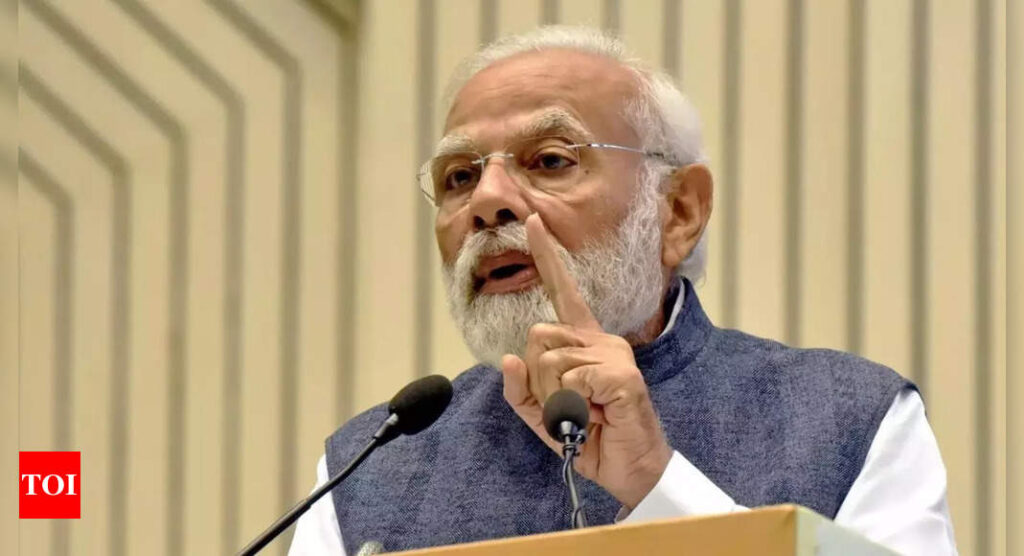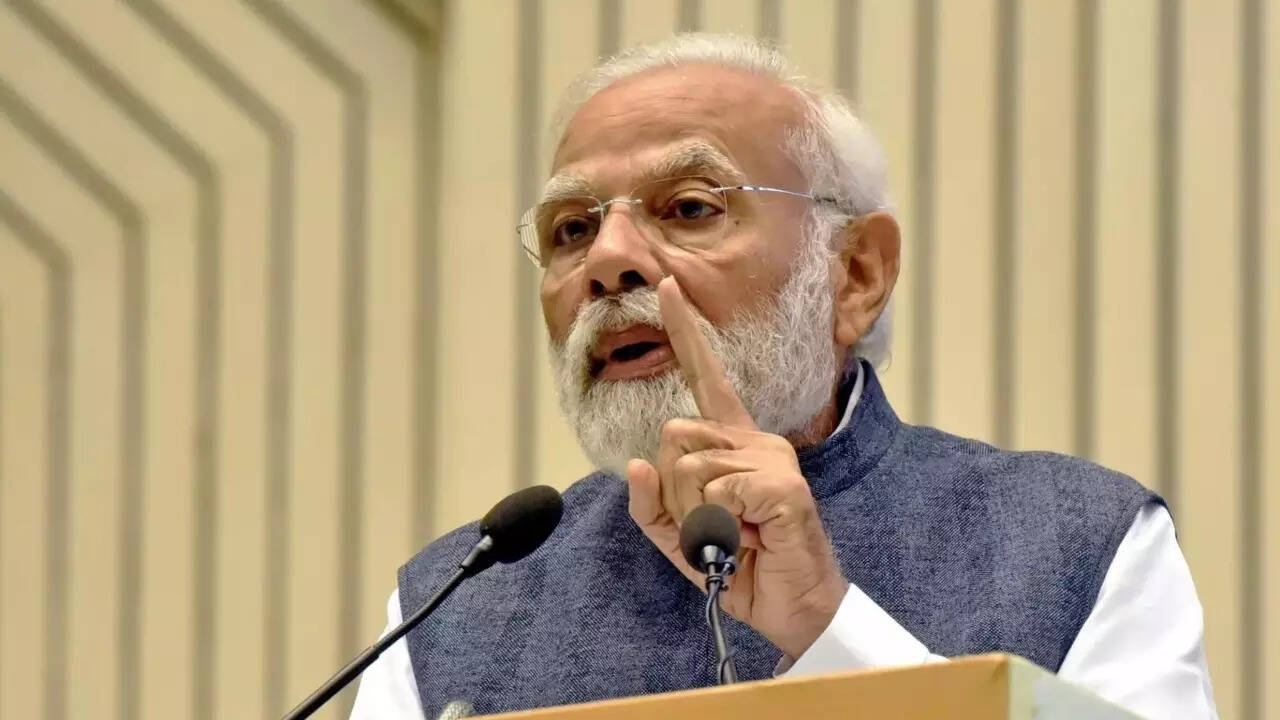[ad_1]
NEW DELHI: Prime Minister Narendra Modi has said that India’s economic growth is a “natural by-product” of his nine-year-old government’s political stability, as he expressed optimism that it will be a developed nation by 2047 with “corruption, casteism and communalism” having no place in our national life.
In an exclusive interview with PTI late last week, the prime minister also stressed on the need for timely and clear communication of policy stance by central banks, and policy actions by each country in their fight against inflation so that it can prevent negative repercussions on others countries.
While most advanced economies are facing an economic slowdown, chronic shortages, high inflation, and ageing populations, the Indian economy is acknowledged to be the fastest-growing large economy with the largest youth population.
“For a long time in world history, India was one of the top economies of the world. Later, due to the impact of colonisation of various kinds, our global footprint was reduced,” he said.
“But now, India is again on the rise. The speed with which we jumped five spots, from the 10th largest economy to the fifth largest in less than a decade has conveyed the fact that India means business,” he noted.
Adding a fourth ‘D’ – development – to the 3Ds of democracy, demography and diversity, he said the period till 2047 is one of huge opportunity and “Indians who are living in this era have a great chance to lay a foundation for growth that will be remembered for the next thousand years.”
India’s USD 3.39 trillion GDP overtook that of the UK in the fiscal year ending March 31, 2022, making it the fifth-largest economy in the world behind the US, China, Japan and Germany.
In the three decades before 2014, Modi said, the country saw many governments that were unstable and therefore, unable to get much done.
“But in the last few years, the people have given a decisive mandate [to BJP], which has led to a stable government, predictable policies and clarity in the overall direction,” he said. “This stability is the reason that over the past nine years, several reforms were brought in.”
These reforms, related to the economy, education, financial sector, banks, digitalisation, welfare, inclusion and social sector, have laid a strong foundation, and “growth is a natural by-product,” he said. The rapid and sustained progress made by India has evoked interest across the world and many countries have been “watching our growth story very closely.”
“They are convinced that this progress is not an accident but is happening as a result of a clear, action-oriented roadmap of ‘Reform, Perform, Transform’,” he said. “For a long time, India was perceived as a nation of over one billion hungry stomachs. But now, India is being seen as a nation of over one billion aspirational minds, more than two billion skilled hands, and hundreds of millions of young people,” he said.
He noted that India is home to more than 100 unicorns, is the third-largest start-up hub and its space sector’s achievements are being celebrated the world over. India is also breaking all previous records in almost every global sports event and more universities are entering the top rankings of the world year after year, he said.
“With such momentum, I am positive that we will be in the top three economies in the near future,” he said. “By 2047, I am sure that our country will be among the developed countries.”
Modi said that as a developed nation, the Indian economy will be even more inclusive and innovative, poor people will comprehensively win the battle against poverty, and the nation’s health, education and social sector outcomes will be among the best in the world.
“Corruption, casteism and communalism will have no place in our national life,” he said.
“The quality of life of our people will be on par with the best countries of the world. Most importantly, we will achieve all of this while caring for both nature and culture,” he said.
EY projects India’s GDP to cross USD 5 trillion by 2028 to overtake both Japan and Germany. But the US economy is projected to still be nearly six times as large as the Indian economy.
The prime minister said inflation is a key issue that the world faces.
“Our G-20 Presidency engaged the G-20 Finance Ministers and Central Bank Governors. It was recognised that timely and clear communication of policy stances by Central Banks is crucial. This can ensure that policies taken by each country to combat inflation do not lead to negative repercussions in other countries,” he said.
The Organisation for Economic Co-operation and Development (OECD) has been targeting proposals to reduce incentives for tax planning and avoidance by limiting tax competition and changing where companies pay taxes. Pillar 1 of the OECD proposal expands a country’s authority to tax profits from companies that make sales into their country but don’t have a physical location there.
“This convention will allow countries and jurisdictions to move forward with historic, major reform of the international tax system,” Modi said. “As you can see, there is substantial progress across many issues. This is also a result of the confidence that other partner countries have shown in India’s Presidency.”
In a recent report, Morgan Stanley called the nine years of Modi government transformational and listed bringing corporate tax at par with peers, infrastructure investment picking pace, rising collection of GST and the increasing share of digital transactions as a percentage of GDP as major initiatives.
In an exclusive interview with PTI late last week, the prime minister also stressed on the need for timely and clear communication of policy stance by central banks, and policy actions by each country in their fight against inflation so that it can prevent negative repercussions on others countries.
While most advanced economies are facing an economic slowdown, chronic shortages, high inflation, and ageing populations, the Indian economy is acknowledged to be the fastest-growing large economy with the largest youth population.
“For a long time in world history, India was one of the top economies of the world. Later, due to the impact of colonisation of various kinds, our global footprint was reduced,” he said.
“But now, India is again on the rise. The speed with which we jumped five spots, from the 10th largest economy to the fifth largest in less than a decade has conveyed the fact that India means business,” he noted.
Adding a fourth ‘D’ – development – to the 3Ds of democracy, demography and diversity, he said the period till 2047 is one of huge opportunity and “Indians who are living in this era have a great chance to lay a foundation for growth that will be remembered for the next thousand years.”
India’s USD 3.39 trillion GDP overtook that of the UK in the fiscal year ending March 31, 2022, making it the fifth-largest economy in the world behind the US, China, Japan and Germany.
In the three decades before 2014, Modi said, the country saw many governments that were unstable and therefore, unable to get much done.
“But in the last few years, the people have given a decisive mandate [to BJP], which has led to a stable government, predictable policies and clarity in the overall direction,” he said. “This stability is the reason that over the past nine years, several reforms were brought in.”
These reforms, related to the economy, education, financial sector, banks, digitalisation, welfare, inclusion and social sector, have laid a strong foundation, and “growth is a natural by-product,” he said. The rapid and sustained progress made by India has evoked interest across the world and many countries have been “watching our growth story very closely.”
“They are convinced that this progress is not an accident but is happening as a result of a clear, action-oriented roadmap of ‘Reform, Perform, Transform’,” he said. “For a long time, India was perceived as a nation of over one billion hungry stomachs. But now, India is being seen as a nation of over one billion aspirational minds, more than two billion skilled hands, and hundreds of millions of young people,” he said.
He noted that India is home to more than 100 unicorns, is the third-largest start-up hub and its space sector’s achievements are being celebrated the world over. India is also breaking all previous records in almost every global sports event and more universities are entering the top rankings of the world year after year, he said.
“With such momentum, I am positive that we will be in the top three economies in the near future,” he said. “By 2047, I am sure that our country will be among the developed countries.”
Modi said that as a developed nation, the Indian economy will be even more inclusive and innovative, poor people will comprehensively win the battle against poverty, and the nation’s health, education and social sector outcomes will be among the best in the world.
“Corruption, casteism and communalism will have no place in our national life,” he said.
“The quality of life of our people will be on par with the best countries of the world. Most importantly, we will achieve all of this while caring for both nature and culture,” he said.
EY projects India’s GDP to cross USD 5 trillion by 2028 to overtake both Japan and Germany. But the US economy is projected to still be nearly six times as large as the Indian economy.
The prime minister said inflation is a key issue that the world faces.
“Our G-20 Presidency engaged the G-20 Finance Ministers and Central Bank Governors. It was recognised that timely and clear communication of policy stances by Central Banks is crucial. This can ensure that policies taken by each country to combat inflation do not lead to negative repercussions in other countries,” he said.
The Organisation for Economic Co-operation and Development (OECD) has been targeting proposals to reduce incentives for tax planning and avoidance by limiting tax competition and changing where companies pay taxes. Pillar 1 of the OECD proposal expands a country’s authority to tax profits from companies that make sales into their country but don’t have a physical location there.
“This convention will allow countries and jurisdictions to move forward with historic, major reform of the international tax system,” Modi said. “As you can see, there is substantial progress across many issues. This is also a result of the confidence that other partner countries have shown in India’s Presidency.”
In a recent report, Morgan Stanley called the nine years of Modi government transformational and listed bringing corporate tax at par with peers, infrastructure investment picking pace, rising collection of GST and the increasing share of digital transactions as a percentage of GDP as major initiatives.
[ad_2]
Source link











More Stories
India’S Growth Forecast: S&P ups India’s FY’24 growth forecast to 6.4% on robust domestic momentum
India to remain fastest-growing major economy, but demand uneven: Poll
Jack Ma: Jack Ma gets back into business with ‘Ma’s Kitchen Food’